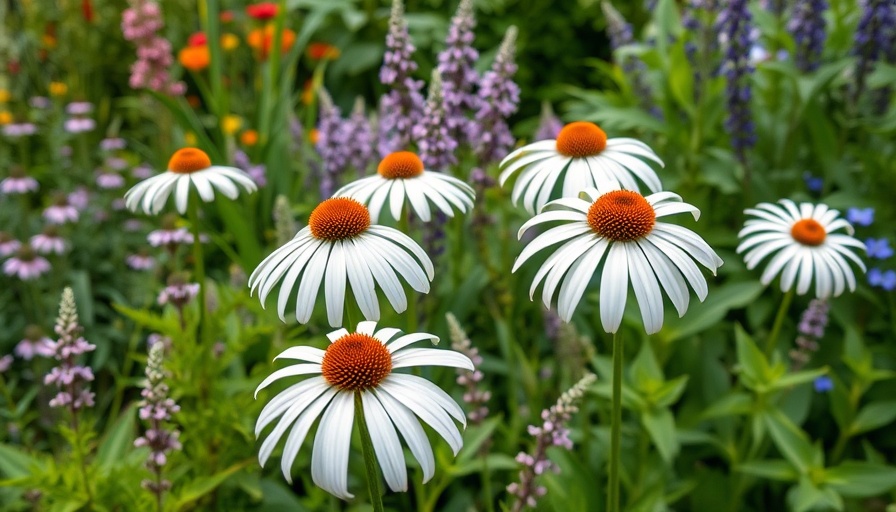
Understanding the Importance of Beneficial Insects in Your Garden
As gardening enthusiasts, we often talk about plants, soil, and sunlight—but what about the tiny creatures that play an essential role in maintaining the health of our gardens? Beneficial insects, such as ladybugs, bees, and predatory wasps, are nature's little allies in pest control and pollination. By creating a healthy ecosystem, these insects not only protect our gardens but also contribute to the broader biodiversity necessary for a flourishing environment.
Common Cleaning Methods That Risk Beneficial Insects
While it’s tempting to clean up the garden using chemicals or aggressive methods, these can inadvertently harm beneficial insects. Pesticides, even those labeled 'organic,' can eliminate the very allies we seek to protect our plants. Techniques like removing dead plant matter might seem harmless, but if done too aggressively, it can disrupt the habitats of beneficial insects living in the debris.
Gentler Alternatives to Traditional Cleanup Techniques
Instead of opting for harsh techniques, consider adopting more holistic approaches to garden cleanup. For example, rather than using a rake to clear leaves and debris, use your hands to gently sift through them. Allowing natural decomposition helps create a nurturing environment for beneficial organisms. Additionally, mulching can be beneficial as it not only suppresses weeds but also provides habitat for various soil-dwelling organisms.
Strategic Pruning: Timing Matters
As part of your garden maintenance, strategic pruning is essential for the health of your plants and beneficial insects alike. Ensure that you’re pruning at the right time, ideally during the late fall or early spring, when insect activity is low. This way, you minimize the risk of disturbing any overwintering insects or those preparing to emerge as the season changes.
Creating Shelters for Beneficial Insects
Beyond cleaning, it's crucial to consider what your garden needs to support beneficial life. Install insect hotels, plant local wildflowers, and encourage diversity within your garden. This not only helps sustain beneficial insects but can also create a vibrant community of pollinators and pest controllers right in your backyard. Implementing such changes can lead to a thriving landscape benefiting both the plants and the gardener.
Why Sustainable Gardening Is the Future
Adopting sustainable gardening practices can have a lasting impact on your garden's health and the environment. Engaging in organic gardening principles, such as using organic compost and natural pest deterrents, helps keep beneficial insects thriving. Ultimately, it’s the synergy between plants, soil, and the insects that creates a sustainable garden ecosystem.
Practical Tips for Your Garden Cleanup
1. **Use Hand Tools:** Opt for hand tools over power tools when clearing debris to avoid disturbing insect habitats.
2. **Leave Some Leaves:** Consider leaving some fallen leaves and plant material in place during the winter to protect overwintering insects.
3. **Encourage Plants that Attract Insects:** Plant lavender, coneflowers, and other flowers to bolster your beneficial insect populations.
4. **Practice Rotational Gardening:** Keep your garden soil healthy and reduce pest buildup by rotating your crops annually.
The Emotional Connection of Gardening
Gardening isn’t just about growing food—it can also be a pathway to emotional healing and self-discovery. By engaging with the land and its inhabitants, you can cultivate a greater sense of purpose and tranquility. Create a garden that reflects not just your aesthetic preferences, but also values the ecosystem and its silent heroes.
In conclusion, cleaning up your garden mindfully—not just thoroughly—can foster a healthy ecosystem where beneficial insects thrive alongside your beloved plants. By choosing gentle methods, removing unnecessary hazards, and creating a hospitable habitat, you can turn your garden into a sanctuary for both flora and fauna.
Now is the time to begin your sustainable gardening journey. Embrace the methods that protect our vital allies and watch your garden blossom with life!
 Add Row
Add Row  Add
Add 




 Add Row
Add Row  Add
Add 

Write A Comment